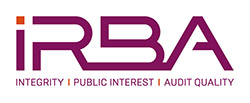IRBA foresees audit reforms will regain confidence in profession if audit firms follow suit
Johannesburg, Wednesday, February 26, 2020 – The Independent Board for Auditors (IRBA) has welcomed government’s support for reform of the audit profession and the backing of its legislative amendments, which formed part of Minister Mboweni’s budget speech today.
Says Bernard Agulhas, CEO of IRBA: “The IRBA has already done some review of the profession following the events of 2017, pertaining to the Gupta Leaks and the collapse of Steinhoff. In our review we identified more than 40 projects as part of restoring confidence in auditing and many are far advanced and beginning to yield some improvement in audit quality.
“The IRBA will be pleased to have the backing of government for a broader review of the audit landscape and profession and are hopeful that the scope of the proposed independent panel will include examining the broader financial reporting chain. We have long advocated for comprehensive regulation and this review may well be the opportune time to assess the potential benefits of such a model of regulating the broader financial reporting chain.
“The IRBA is committed to leading changes in the profession, as we have demonstrated with our initiatives over the last two years, and will support National Treasury in the review process which will no doubt seek to find solutions which will enhance the effectiveness of the audit product and reduce the expectation gap between what auditors do and what the public expects.
Auditing is not a profession best characterised by innovation. Auditors do not manufacture products; therefore, the practical rules of product innovation do not apply. Other than the Enron moment in 2001 which led to the Sarbanes-Oxley Act of 2002, very little has changed in the role of auditors or in the audit product. However, as a result of a series of large corporate collapses in jurisdictions around the world, the profession has in recent years faced unprecedented pressure to change. Not just here in South Africa, but globally.
“The IRBA’s participation on international structures, and in particular at the International Forum of Independent Audit Regulators, has given us insight into how regulators around the world are contending with how to balance innovation with regulation and achieve a right touch framework which delivers audit quality, trust in auditor opinions and which attempts to close the ‘expectation gap’.”
The IRBA has frequently referred to the fact that auditors are not selling an audit; auditors are in the business of selling confidence to investors. So, the question becomes, how does one innovate confidence which is a “product” that resides in the heart and minds of the users and not the in the hands of the auditors?
Says Agulhas: “The rise of independent audit regulators around the globe through the growth of IFIAR, which now represents 54 countries, all of which have audit regulators which meet the independence criteria of the forum, is absolutely key. As we have seen with state capture here in South Africa, any capture, including regulatory capture, can and often does result in influence peddling and the advancing of individual agendas, which is not always in the public interest.
“At the heart of independent audit regulation is the requirement to be free of influence from the audit firms, to focus on public interest and remain independent from political agendas. It is this independence of the audit regulator which will give the public confidence in the strength of oversight, and that the regulator will act in the best interest of the public and investors. This is what will build confidence in audit opinions and stimulate investment.”
The UK government has further recognised that it is not only the auditors who should be regulated but also directors and audit committees. The proposed Auditing Reporting Governance Authority (ARGA) will have a broad mandate to have oversight over the broader financial reporting chain.
Locally, the Auditing Profession Act amendments process is underway. While this only addresses regulation of auditors, it provides the IRBA with increased powers at the investigation stage which will help to speed up investigations into improper conduct. The amendments also simplify the requirements for the disciplinary hearing process, which will increase the pool of members on which to draw to establish hearing panels, and reduce the hearing panel from six to three members. This will ensure the IRBA can set down more matters and run hearings concurrently with multiple panels, far more cost effectively and quickly. These improved and simplified processes will ultimately lead to better investor and public protection.
At the heart of the expectation gap is the fact that not every business failure is an audit failure. Auditors are not trained to detect fraud. Part of the regulatory response is to review the fraud risk standards to see whether auditors should be expected to do more work around fraud. It will therefore be important for the IRBA to review auditor competencies in respect of public expectations, and in response to Minister Mboweni’s objectives to address corruption.
Says Agulhas: “A review of the profession is not unexpected, Sir Donald Brydon conducted a UK government probe into the profession during 2019, which sought to identify ways to improve the effectiveness of audits. While his findings apply to the UK, the IRBA has already reviewed the recommendations to see where the IRBA can add further projects to our activities to restore confidence.”
Recently Brydon was quoted as saying that "it is not auditors that cause companies to fail; that’s the result of the actions of directors, I’m a little troubled by the current mood that reaches for a shotgun aimed at auditors every time there’s a corporate problem."
Says Agulhas: “What Brydon describes is the sort of kneejerk reaction we’ve seen in South Africa as well, which aims for the auditors and lets directors, executives and others off the hook for their role in what happened. This is why the IRBA fully backs the World Bank’s recommendations - first detailed in its 2013 report on accounting and auditing - that the full reporting chain should be regulated.
“Recognising that there are other role players with whom lies certain responsibilities and accountability, does not mean that auditors don’t have work to do. Locally, the profession needs to reassert the primacy of professional scepticism and independence.
If the profession in South Africa wants to get serious about restoring trust in its corporate sector, it will have to face the fact that changing the audit product to narrow the gap is becoming a necessity. Resistance to changes demanded by those who rely on audit opinions is futile. While the IRBA can respond to such issues raised by the public, the regulator can only do so much to create the environment for change. Real change will come about when the audit firms follow suit.
Ends
More about the IRBA:
The IRBA is a public protection statutory body established to protect the financial interests of the public by ensuring registered auditors and their firms deliver services of the highest quality. It upholds audit firm independence to ensure that audit quality is such that it enhances the accuracy and credibility of financial performance reporting. In this way, the IRBA has an important role to play in building the reputation of South Africa as an investment market for both local and global investors and driving economic growth for the country.
The IRBA also registers suitably qualified accountants as auditors, who must adhere to the highest ethics standards, and promotes the auditing profession through the effective regulation of assurance conducted in accordance with internationally recognised standards and processes.
| Issued by: | Lorraine van Schalkwyk APR Manager: Special Projects and Media Relations The Independent Regulatory Board for Auditors (IRBA) Contact: 087 940 8800 Mobile: 083 626 3762 |
| On behalf of: | Bernard Peter Agulhas Chief Executive Officer |





